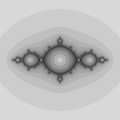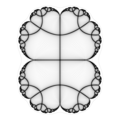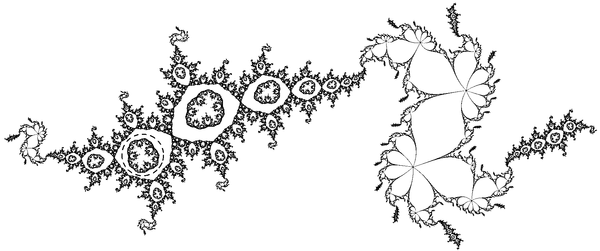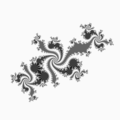Classification of Fatou components
In mathematics, Fatou components are components of the Fatou set.
Rational case
If f is a rational function
defined in the extended complex plane, and if it is a nonlinear function (degree > 1)
then for a periodic component of the Fatou set, exactly one of the following holds:
- contains an attracting periodic point
- is parabolic[1]
- is a Siegel disc : a simply connected Fatou component on which f(z) is analytically conjugate to a Euclidean rotation of the unit disc onto itself by an irrational rotation angle.
- is a Herman ring: a double connected Fatou component (an annulus) on which f(z) is analytically conjugate to a Euclidean rotation of a round annulus, again by an irrational rotation angle.
 Julia set (white) and Fatou set (dark red/green/blue) for with in the complex plane.
Julia set (white) and Fatou set (dark red/green/blue) for with in the complex plane. Julia set with superattracting cycles (hyperbolic) in the interior and the exterior
Julia set with superattracting cycles (hyperbolic) in the interior and the exterior Level curves and rays in superattractive case
Level curves and rays in superattractive case Julia set with parabolic cycle
Julia set with parabolic cycle Julia set with Siegel disc (elliptic case)
Julia set with Siegel disc (elliptic case) Julia set with Herman ring
Julia set with Herman ring
Attracting periodic point
The components of the map contain the attracting points that are the solutions to . This is because the map is the one to use for finding solutions to the equation by Newton-Raphson formula. The solutions must naturally be attracting fixed points.
Herman ring
The map
and t = 0.6151732... will produce a Herman ring.[2] It is shown by Shishikura that the degree of such map must be at least 3, as in this example.
More then one type of component
If degree d is greater then 2 then there is more then one critical point and then can be more then one type of component
 Herman+Parabolic
Herman+Parabolic Period 3 and 105
Period 3 and 105 attracting and parabolic
attracting and parabolic
Transcendental case
Baker domain
In case of transcendental functions there is another type of periodic Fatou components, called Baker domain: these are "domains on which the iterates tend to an essential singularity (not possible for polynomials and rational functions)"[3][4] Example function :[5]
Wandering domain
Transcendental maps may have wandering domains: these are Fatou components that are not eventually periodic.
See also
- No wandering domain theorem
- Montel's theorem
- John Domains[6]
References
- Lennart Carleson and Theodore W. Gamelin, Complex Dynamics, Springer 1993.
- Alan F. Beardon Iteration of Rational Functions, Springer 1991.
- wikibooks : parabolic Julia sets
- Milnor, John W. (1990), Dynamics in one complex variable, arXiv:math/9201272, Bibcode:1992math......1272M
- An Introduction to Holomorphic Dynamics (with particular focus on transcendental functions)by L. Rempe
- Siegel Discs in Complex Dynamics by Tarakanta Nayak
- A transcendental family with Baker domains by Aimo Hinkkanen , Hartje Kriete and Bernd Krauskopf
- JULIA AND JOHN REVISITED by NICOLAE MIHALACHE